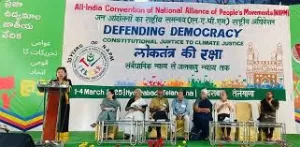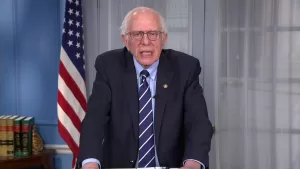Susan Price
Swedish climate activist Greta Thunberg, German climate activist Luisa Neubauer and Belgian climate activists Anuna de Wever and Adélaïde Charlier initiated an open letter to European Union and global leaders in July, calling on them to #FaceTheClimateEmergency.
The letter, which has now been signed by thousands of prominent individuals and supporters, was sent to all EU leaders and heads of state on July 16.
Thunberg and Neubauer secured a meeting with German Chancellor Angela Merkel on August 20. Germany now holds the EU Council Presidency. The meeting will coincide with the second anniversary of Thunberg’s solo protest outside the Swedish parliament, calling for tougher climate action, which led to the Fridays for Future (FfF) movement.
Fridays for Future announced a new global day of climate action for September 25. Protests will take place around the world, “adjusted according to COVID-19 circumstances”. FfF said the COVID-19 pandemic has “forced activists to find new ways of protest and use digital activism to demand climate action, as marches have not been appropriate”.
“The coming months and years will be crucial in ensuring a safe pathway below a 1.5°C increase in global mean temperature … If we are to minimise the risks of triggering irreversible chain reactions beyond human control, we need to act now.
“It is therefore vital that the climate crisis doesn’t get forgotten in the shadow of the coronavirus, but is regarded as the utmost priority.”
The letter sets out a raft of demands, as “first steps”, essential “to avoiding a climate and ecological disaster” and includes: an immediate halt to all investments in fossil fuel exploration and extraction, an end to all fossil fuel subsidies and immediate and complete divestment from fossil fuels.
The letter also calls on EU member states to advocate that ecocide be made an international crime and for total emissions in all figures and targets to include the consumption index, international aviation and shipping.
The letter calls for the immediate establishment of annual, binding carbon budgets and targets “based on the current best available science and the [Intergovernmental Panel on Climate Change’s] budget, which gives us a 66% chance of limiting the global temperature rise to below 1.5°C”.
Such targets “need to include the global aspect of equity, tipping points and feedback loops and shouldn’t depend on assumptions of possible future negative emissions technologies”.
The letter also addresses the issue of a just transition for workers and calls for the safeguard and protection of democracy. It calls on governments to “design climate policies that protect workers and the most vulnerable and reduce all forms of inequality: economic, racial and gender.”
The final demand is to “treat the climate — and ecological emergency like an emergency”.
“The changes necessary to safeguard humanity may seem very unrealistic,” said the letter. “But it is much more unrealistic to believe that our society would be able to survive the global heating we’re heading for, as well as other disastrous ecological consequences of today’s business-as-usual.
The letter continues:
“The last few months, the world has watched with horror how the COVID-19 pandemic has hit people all over the globe.
“During this tragedy, we are seeing how many — not all — world leaders and people around the world stepped up and acted for the greater good of society.
“It is now clearer than ever that the climate crisis has never once been treated as a crisis, neither from the politicians, media, business, nor finance. And the longer we keep pretending that we are on a reliable path to lower emissions and that the actions required to avoid a climate disaster are available within today’s system … the more precious time we will lose.
“One other thing that has become clearer than ever: Climate and environmental justice cannot be achieved as long as we continue to ignore and look away from the social and racial injustices and oppression that have laid the foundations of our modern world.”
The letter calls on the EU to “deliver on its promises” and slams the target of net zero emissions by 2050 as “surrender”.
“This target is based on a carbon budget that only gives a 50% chance of limiting the global heating below 1.5°C. That is just a statistical flip of a coin which doesn’t even include some of the key factors, such as the global aspect of equity, most tipping points and feedback loops, as well as already built in additional warming hidden by toxic air pollution. So in reality it is much less than a 50% chance.”
On July 21, EU leaders agreed on a Euro 1.8 billion economic recovery plan for Europe, called Next Generation EU.
“Talking about a ‘Next Generation EU’ investment program while continuing to ignore the climate crisis and the full scientific picture is a betrayal to all ‘next generations’,” said the letter.
“Aiming to ‘recover’ an economic system that inherently fuels the climate crisis in order to finance climate action is just as absurd as it sounds.
“Our current system is not ‘broken’ — the system is doing exactly what it’s supposed and designed to be doing. It can no longer be ‘fixed’. We need a new system.
“The race to safeguard future living conditions for life on Earth as we know it needs to start today. Not in a few years, but now. And this needs to include a science-based pathway, which gives us the best possible odds to limit the global average temperature rise to below 1.5°C.
“We need to end the ongoing wrecking, exploitation and destruction of our life supporting systems and move towards a fully decarbonised economy that centres around the wellbeing of all people as well as the natural world.
“If all countries were to actually go through with the emission reductions they have set as goals, we would still be heading for a catastrophic global temperature rise of at least 3–4°C. The people in power today have so far practically already given up on the possibility of handing over a decent future for coming generations. They have given up without even trying.
“The world’s planned fossil fuel production by the year 2030 accounts for 120% more than what would be consistent with the 1.5°C target. It just doesn’t add up.”
(Susan Price is an Australian unionist and socialist for more than 20 years.)




